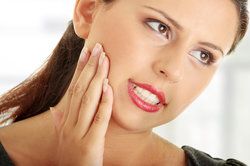Braces and Bruxism
 Bruxism, the grinding or clenching of teeth, is something we all do on occasion. However, for some, bruxism becomes so ingrained that they damage their teeth, gums, and jaw.
Bruxism, the grinding or clenching of teeth, is something we all do on occasion. However, for some, bruxism becomes so ingrained that they damage their teeth, gums, and jaw.
The reason for bruxism in not entirely understood, but a variety of causes are suspected, including misaligned teeth. If you suspect a bad bite is causing your nightly grinding and clenching, Dr. Kellyn Hodges' is an orthodontist in Philadelphia who can determine if braces may help you.
Braces and Teeth Grinding
If you have crooked teeth or an abnormal alignment of your upper and lower teeth, you may be prone to grinding your teeth. To prevent damage, an orthodontist may recommend getting braces. Braces will nudge your teeth into their correct positions and allow biting forces to be distributed properly. This may relieve or reduce bruxism.
There are a variety of braces available and an orthodontist can guide you to the type that would be best for your problems. Some patients may be able to use Invisalign® to correct their teeth. Invisalign® uses clear, plastic aligners to gently move teeth into place, just like regular braces. However, unlike wire braces, the Invisalign® aligners are comfortable plastic trays that simply slip onto your teeth. Made of out clear plastic, they are nearly invisible and more comfortable than metal braces.
Traditional braces can also be used to correct teeth alignment to reduce the grinding and clenching of bruxism.
Though a bad bite (malocclusion) is believed to be one of the causes of bruxism, it is not the only one. Treatment will depend on what is causing your excessive grinding and clenching. Other sources of bruxism include stress, medication side effects, and excessive consumption of caffeine or alcohol. An orthodontist can help you pinpoint the cause.
Other Treatments for Bruxism
Other ways to treat bruxism, or at least prevent more damage, include:
- Mouth guard or splints, to prevent damage to teeth.
- Stress reduction, including exercise, meditation, or counseling.
- Muscle relaxants or botulism toxin, for extreme cases.
- Lifestyle changes: Avoiding caffeine, alcohol, and chewing gum.
Bruxism Damage
Bruxism can occur as often as 40 minutes out of every hour during sleep and produce up to 250 pounds of force per square inch. Over time, the continued pressure can cause a variety of problems, including:
- Micro cracks and broken fillings, which can lead to nerve damage.
- Teeth ground down to the dentin, causing sensitivity to hot and cold.
- Gum recession.
- Loose teeth.
- Headaches, aching jaws.
Picking the right treatment is important and it may take several attempts to find a solution. For example, people with bite problems may get braces, but the reduction in bruxism may be temporary and reappear after treatment. Splints and mouth guards may protect teeth and reduce clenching, but some patients find they do not help, or make the condition worse.
If you suffer from bruxism and are worried it is damaging your teeth, a personal consultation is the first step in finding a solution that works for you.
Please call today for an appointment.


